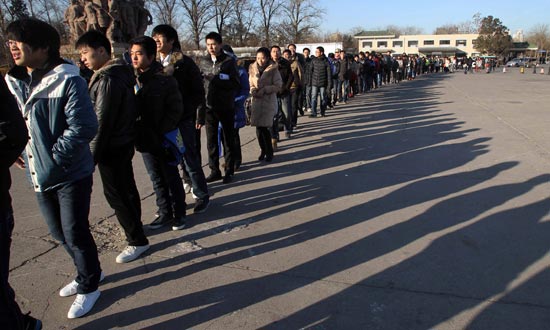Higher pay, better terms dent Foxconn's profits
 0 Comment(s)
0 Comment(s) Print
Print E-mail Agencies via China Daily, April 9, 2012
E-mail Agencies via China Daily, April 9, 2012
Foxconn Technology's agreement to improve the lot of its 1.2 million workers in China who make Apple Inc's iPads and iPhones is a signal that China is losing its title as the world's lowest-cost producer of everything.
After years of squeezing the profit margins of contract manufacturers making the gadgets beloved by consumers worldwide, the time is drawing nearer when big brand names may have to forgo some of their profits to overcome criticism their products are built off the back of mistreated Chinese workers.
|
|
|
Applicants line up at a job fair in Beijing. The Chinese economy is overshadowed by rising costs and labor shortages. [Photo/China Daily] |
"The time of low costs and cheap labor in the Chinese mainland has come to an end," said Jay Huang, chief financial officer of Taiwan's Wintek, a maker of touch panels for Apple and other brands with annual revenues last year of some $3 billion.
Wintek has boosted amenities for its workers, including the installation of video conferencing to call their families. Another Apple contract manufacturer, Pegatron, has reorganized some workers away from single-task jobs into multi-skilled teams.
In a landmark agreement last week, Apple and Foxconn agreed to tackle violations of conditions among the Chinese workers assembling the iconic gadgets of the US firm.
Taiwan-based Foxconn, which also makes products for other names, including Dell Inc, Hewlett-Packard and Sony Corp, agreed to the changes after the Free Labor Association surveyed three plants and 35,000 workers.
Foxconn, whose subsidiary Hon Hai Precision Industry is the main assembler of Apple products in factories on the mainland, will hire tens of thousands of new workers, eliminate illegal overtime, improve safety protocols and upgrade workers' accommodation and other amenities.
China's economics and policy direction now suggest workers are a more powerful force. Labor shortages and double-digit wage inflation give workers more choice. They are more likely to jump to another job to secure higher pay.
The government has pledged to lift migrant factory workers wages to ease wealth inequalities in the country. In response, many manufacturers are shifting to cheaper inland regions to keep costs down.
"What makes it different this time is that there are more internal reasons," said Zhigang Tao, professor in the Faculty of Business and Economics at the University of Hong Kong.
"Now the bigger driving force is from inside China - a rising yuan, social harmony and wealth redistribution."
China has to change from low-cost production to further its development.
"It's a turning point for the whole country. It's also part of the overall strategy to change to more domestic consumption and less exporting."
It remains to be seen how much major brands will give up so that their contract manufacturers can afford to upgrade conditions for workers.
Critics say there is often a gap between the rhetoric of high-flying corporate social responsibility and actual practices on the ground.
Hon Hai's results show it produced a profit margin in 2011 of 2.94 percent, down from more than 9 percent in 2001. Analysts say the profit margin on Apple contracts is possibly as much as 4 percent.
A teardown costing of Apple's iPad 2 by electronics market research firm IHS iSuppli shows a version that retails for $600 may cost less than $300 in components and just under $10 for manufacturing, leaving Foxconn with less than 2 percent of the retail price.
"Even though I don't expect dramatic changes, the critique right now helps contract makers to improve the working environment," said Charles Lin, chief financial officer of Pegatron, which also supplies Acer Inc and Toshiba Corp.
"It's a social problem, so it shouldn't be just the contract makers' job to bear the burden. They have to have enough profit before they can make the improvements."
HP Chief Executive Meg Whitman, for one, recognizes that Foxconn may have little room for maneuver on cost.
"If Foxconn's labor cost goes up ... that will be an industry-wide phenomenon and then we have to decide how much do we pass on to our customers versus how much cost do we absorb," she told Reuters in February.
Meanwhile, contract makers are looking for solutions.
In two factories, Pegatron staff work in a group and rotate through multiple tasks rather than doing a repetitive task on a traditional conveyer line.
"The pay is higher because of the multiple skills required in a worker, but then the productivity is also higher," Lin said. Pegatron had revenues last year of almost $13 billion.
As well as the video conferencing, Wintek has added new entertainment facilities in worker dormitories, including weight-training machines, pool tables, table tennis and audio facilities.
It has even increased food choices, for example Western-style breakfasts.
There are skeptics who say any change will only occur slowly.
Small contract firms that lack a big backer such as Apple will be under less pressure to take action on wages and conditions.
"Market chatter is that Apple is paying for Foxconn's pay rise this time. It's like a marketing fee for Apple because it cares a lot about its environmentally caring image," said Ming Chi Kuo, an analyst at KGI Securities in Taipei.
"For smaller component suppliers who don't have Apple paying the bill for pay rises, they face big cost pressure."






